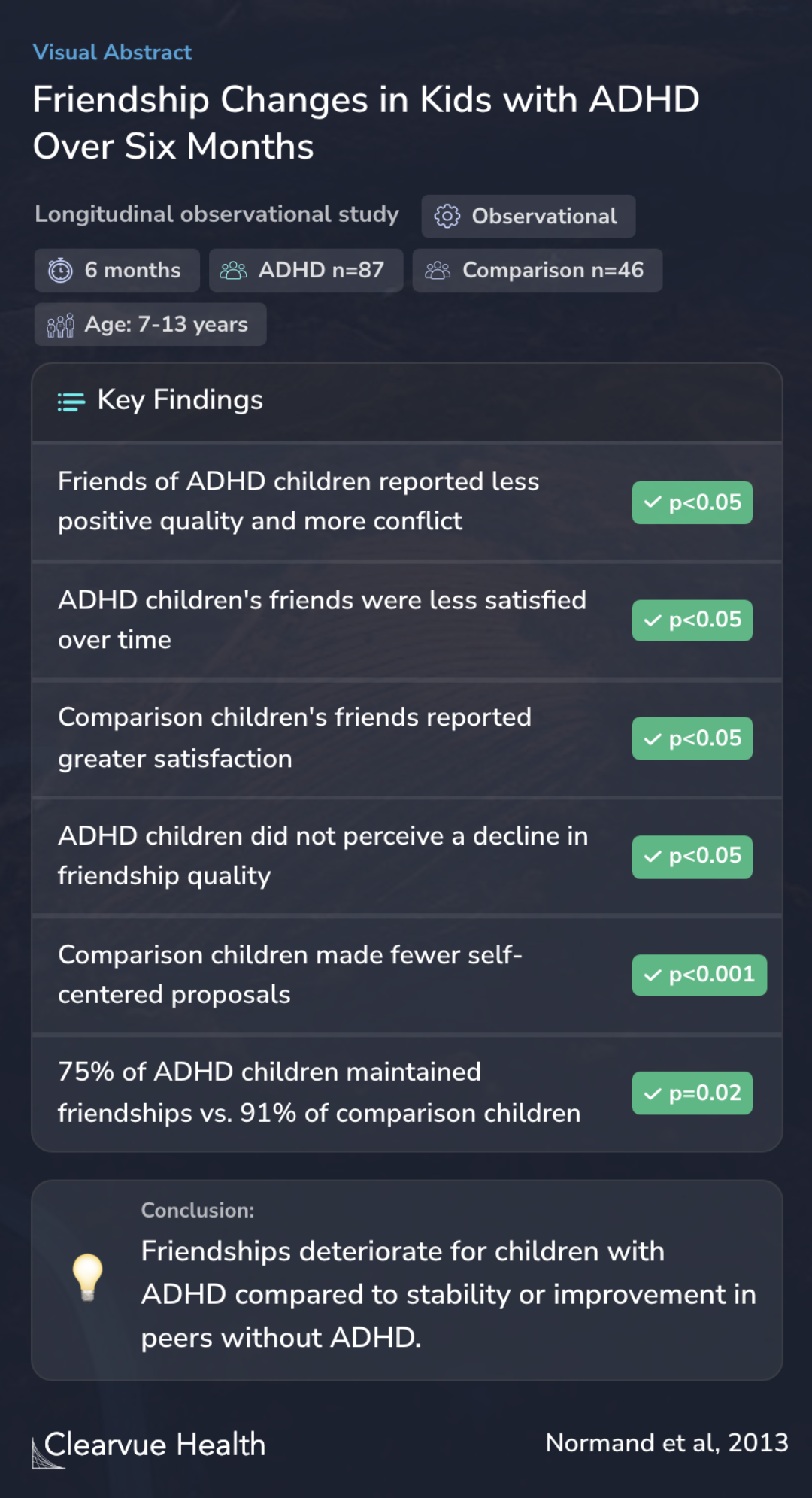Continuities and changes in the friendships of children with and without ADHD: a longitudinal, observational study
Friendship Changes in Kids with ADHD Over Six Months
Normand S, Schneider BH, Lee MD, Maisonneuve MF, Chupetlovska-Anastasova A, Kuehn SM, Robaey P

Objectives
The study delved into the dynamics of friendships among children with Attention Deficit Hyperactivity Disorder (ADHD) compared to those without the condition. Specifically, it tracked how these friendships evolved over six months, focusing on 87 children diagnosed with ADHD and 46 children without ADHD, most of whom were boys and aged between 7 and 13 years.
We examined how the real-life dyadic friendships of 87 children with ADHD and 46 comparison children (76 % boys) aged 7-13 years evolved during a 6-month follow-up period.
Methods
The research employed a mix of self-reported measures on the quality of friendships and direct observation. The children's interactions with their friends were closely watched during three structured activities designed to mimic real-life situations. This approach provided a comprehensive view of how these children engage with their peers over time.
The methods included friendship quality self-report measures and direct observation of friends' dyadic behaviors in three structured analogue tasks.
Results
As time went by, a distinct pattern emerged among the children with ADHD. Their friends started to feel less positive about their relationship, noting an increase in conflicts and a decrease in satisfaction compared to six months earlier. On the other hand, the friends of the children without ADHD reported experiencing more positive aspects and greater satisfaction in their friendships over the same period.
Interestingly, despite the negative feedback from their friends, the children with ADHD did not perceive any decline in the quality of their friendships.
Moreover, the study observed that children without ADHD were more mindful of the rules in games over time, unlike their ADHD counterparts who tended to break more rules. This behavior extended to negotiations with friends, where children without ADHD showed a decrease in self-centered proposals.
These findings point to the nuanced challenges children with ADHD face in maintaining the quality of their friendships, underscored by their difficulties in perceiving and adapting to social cues and norms.
At Time 2, the friends of the participants with ADHD reported less positive friendship quality and more conflict with their friends than at Time 1. They were also considerably less satisfied with their friendship than 6 months prior. In contrast, the friends of comparison children report...
Conclusions
The study sheds light on the complex nature of friendships among children with ADHD, revealing a trend towards deterioration in the quality of these relationships over a six-month period. This contrasted with the stability or improvement observed in the friendships of children without ADHD. The inclination to break more game rules and engage in self-centered negotiations emerged as significant factors contributing to this decline.
Friendship dynamics over a 6-month period reveal notable differences between children with and without ADHD, indicating a deterioration in the quality of friendships for children with ADHD, in contrast with stability or improvement among comparison children. Efforts to break more game ru...
Key Takeaways
Context
These insights are part of a broader conversation on the social challenges faced by children with ADHD, as evidenced by other research in the field. For instance, Marshall et al. (2014) found that children with a certain type of ADHD and sluggish cognitive tempo exhibit more social and academic difficulties, highlighting the diverse impacts of ADHD on children's lives.
Furthermore, research by Abikoff et al. (2004) explored the potential of ADHD medication combined with multimodal psychosocial treatment to enhance social functioning. However, their findings suggest that medication alone might be sufficient in addressing social challenges, without the need for additional social skills training.